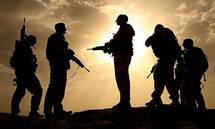
"Stepping that up means that the Afghans take more responsibility for their own affairs. They're backed up by partnering and mentoring done by the British forces."
In talks with US commander General Stanley McChrystal, Brown discussed the possibility that increasing the pace of training could require bringing in more British troops, the BBC said.
Overall, Britain hopes that 134,000 Afghan soldiers and 97,000 police will be trained by the end of 2011, a spokeswoman for Brown's office said.
The prime minister told reporters that he had discussed the army training programme in telephone conversations with President Hamid Karzai and Abdullah Abdullah, Karzai's main rival in the August 20 presidential election.
Concern at the British death toll in Afghanistan was further heightened when a British soldier was killed in an explosion in Helmand on Saturday.
The Royal Marine, who died while on a foot patrol in Gereshk, was the 208th British soldier to die since the US-led invasion in 2001.
Britain's losses have increased sharply since the start of July when British and Afghan forces launched an operation against the Taliban in Helmand in a bid to create safe conditions for the election.
Brown promised another 200 specialists would be deployed later this year to help counter the threat posed by roadside bombs, or improvised explosive devices (IEDs), the BBC said.
Many of the British casualties have been caused by IEDs planted by the Taliban.
The prime minister also highlighted new equipment, such as additional armoured vehicles, being brought into the field, in a bid to counter accusations that British troops are poorly equipped.
"(This is) new equipment simply to give better protection to our forces and at the same time to make them more manoeuvrable," he said.
"That, working with a big lift in the Afghan forces, is going to be the next stage of the post-election effort in Afghanistan."
Brown met British troops at their Camp Bastion base in the volatile southern province and thanked them for their efforts in fighting insurgents in the build-up to the election.
This was his fourth trip to Afghanistan in just over a year, in a trip designed to show his commitment to the conflict amid signs that public support is waning.
London's ambassador to Kabul, Mark Sedwill, said this week he expects Britain's presence in Afghanistan to last at least "a generation," but hoped that they would stop fighting within five years.
"I hope that British forces are no longer in combat roles three to five years from now because the Afghan forces should by then be big enough and capable enough to take on that frontline task," he told reporters.
----------------------------------------------------------------------------------------------------------------------------------
In talks with US commander General Stanley McChrystal, Brown discussed the possibility that increasing the pace of training could require bringing in more British troops, the BBC said.
Overall, Britain hopes that 134,000 Afghan soldiers and 97,000 police will be trained by the end of 2011, a spokeswoman for Brown's office said.
The prime minister told reporters that he had discussed the army training programme in telephone conversations with President Hamid Karzai and Abdullah Abdullah, Karzai's main rival in the August 20 presidential election.
Concern at the British death toll in Afghanistan was further heightened when a British soldier was killed in an explosion in Helmand on Saturday.
The Royal Marine, who died while on a foot patrol in Gereshk, was the 208th British soldier to die since the US-led invasion in 2001.
Britain's losses have increased sharply since the start of July when British and Afghan forces launched an operation against the Taliban in Helmand in a bid to create safe conditions for the election.
Brown promised another 200 specialists would be deployed later this year to help counter the threat posed by roadside bombs, or improvised explosive devices (IEDs), the BBC said.
Many of the British casualties have been caused by IEDs planted by the Taliban.
The prime minister also highlighted new equipment, such as additional armoured vehicles, being brought into the field, in a bid to counter accusations that British troops are poorly equipped.
"(This is) new equipment simply to give better protection to our forces and at the same time to make them more manoeuvrable," he said.
"That, working with a big lift in the Afghan forces, is going to be the next stage of the post-election effort in Afghanistan."
Brown met British troops at their Camp Bastion base in the volatile southern province and thanked them for their efforts in fighting insurgents in the build-up to the election.
This was his fourth trip to Afghanistan in just over a year, in a trip designed to show his commitment to the conflict amid signs that public support is waning.
London's ambassador to Kabul, Mark Sedwill, said this week he expects Britain's presence in Afghanistan to last at least "a generation," but hoped that they would stop fighting within five years.
"I hope that British forces are no longer in combat roles three to five years from now because the Afghan forces should by then be big enough and capable enough to take on that frontline task," he told reporters.
----------------------------------------------------------------------------------------------------------------------------------









 Home
Home Politics
Politics









